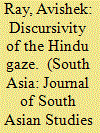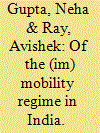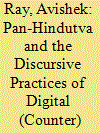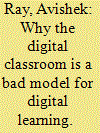|
|
|
Sort Order |
|
|
|
Items / Page
|
|
|
|
|
|
|
| Srl | Item |
| 1 |
ID:
172220


|
|
|
|
|
| Summary/Abstract |
The ‘travelogue’ as a genre in late nineteenth-century India is intrinsically linked with colonial exposure, literary modernity and the ethos of a nascent Indian nationalism. This paper uses Bholanauth Chunder’s The Travels of a Hindoo to Various Parts of Bengal and Upper India (1869) as a case study to illustrate how travelling practices in colonial India were, among other things, aimed at achieving cultural proximity with the coloniser. It examines how the relationship between the traveller (Chunder) and the ‘travelled’ was mediated by heuristic categories emerging out of Western imperialism, particularly the conceptual category of ‘Hindoo’, that were being fervently invoked in the nineteenth century. I argue that Chunder’s ‘Hindoo’ gaze fostered a communal ethos at a time when cultural histories were being woven from a highly contingent process of political partisanship amid struggles over the meaning of nationhood and citizenship, interacting with (anti-)imperialist ideologies laced with notions of territorialisation.
|
|
|
|
|
|
|
|
|
|
|
|
|
|
|
|
| 2 |
ID:
180060


|
|
|
|
|
| Summary/Abstract |
In this paper, we examine how the Indian welfare-capitalist state, in responding to the pandemic in diverse ways, has appealed to the ‘guilt conscience’ and played on the vexed positionality of the mobile elite, who following the pandemic, have to give up their freedom of mobility. We argue that the very condition of political legibility of the mobile subject is predicated upon the ethico-moral ideal of the ‘good citizen’, who, in the statist imagination, ought to not only feel guilty but also compromise their civil liberties in questions of mobility. Under this quasi-medical dispensation, all mobilities become transgressive acts, while the implementation of the prevailing immobility regime depends more on the good citizen’s ethico-moral imperative than any discourses of legality or pathology.
|
|
|
|
|
|
|
|
|
|
|
|
|
|
|
|
| 3 |
ID:
184409


|
|
|
|
|
| Summary/Abstract |
In December 2019, the Indian parliament implemented the Citizenship Amendment Act (CAA) that gives non-Muslim immigrants from the neighboring countries an easy access to Indian citizenship. Across India, the CAA has garnered support and provoked protests in equal measure. This paper examines how #SupportCAA constantly negotiates between two parallel objectives: first, to achieve a pan-national unification of non-Muslim “Indians” (practically, Hindus); and second, to reconfigure India as a site for the pan-Hindutva communion against the Muslim Other. It seeks to understand: How does #SupportCAA as a platform furnish pan-Hindutva discourses, while rendering agency to an “imagined community” of pan-national CAA supporters? How do the CAA ideologues function as “networked publics,” and then go on to territorialize certain online spaces/fora? What does the CAA bequeath to the “imagined community” in question? What vocabulary of political partisanship does such territorialization furnish? How does it draw on the discourses of religious nationalism and remain nearly impervious to any dissent?
|
|
|
|
|
|
|
|
|
|
|
|
|
|
|
|
| 4 |
ID:
186304


|
|
|
|
|
| Summary/Abstract |
The pandemic has compelled educational institutes across the world to hastily adopt, adapt and cope with digital learning by developing ‘digital classrooms’, virtual learning environments replete with sophisticated technological features. The eagerness of the intent to ramp up technological infrastructures, however, is not reflected in the rethinking or redesigning of pedagogies for digital learning. Technocratic ambitions often have very little, if anything, to do with pedagogy. Moreover, the digital classroom is ‘global’ by design, and the ethnocentric framework wrought upon by such designs impedes the decolonizing of the curriculum. It depletes local pedagogic cultures: local histories and cultures, political and moral economies. This article argues that imagining the digital classroom a-temporally and a-culturally, typically from a technocratic point of view, signals a tryst with (techo-)orientalism in its new avatar.
|
|
|
|
|
|
|
|
|
|
|
|
|
|
|
|
|
|
|
|
|